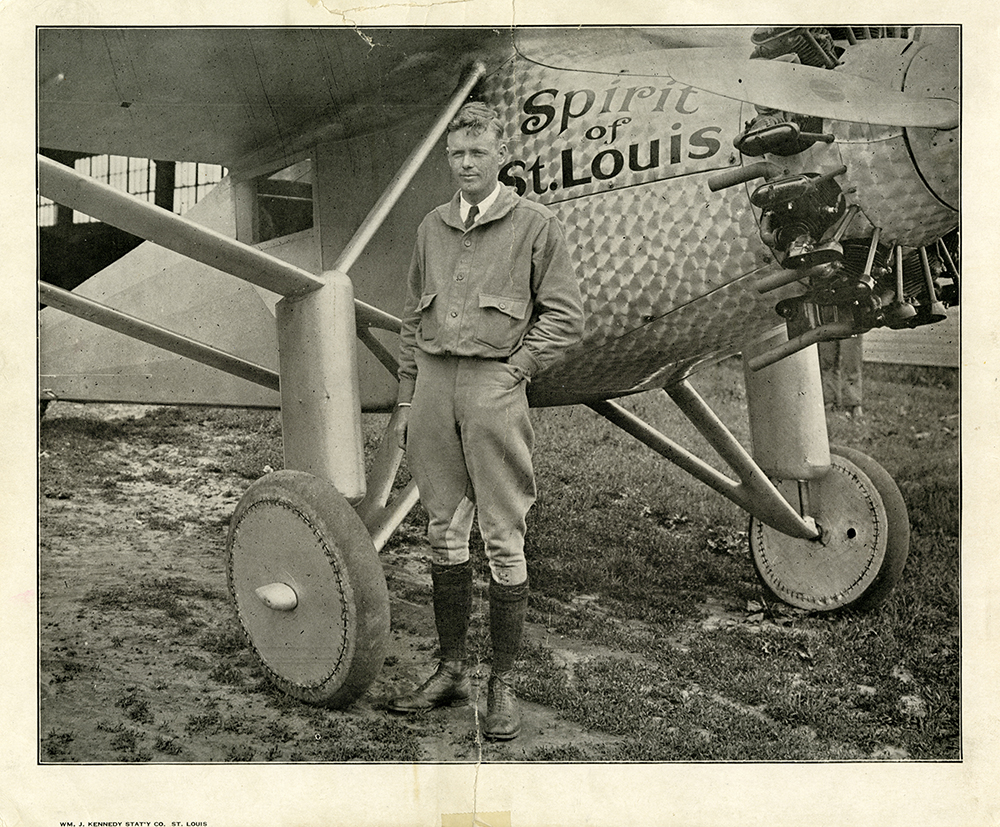Born on February 4, 1902, in Detroit, Michigan, Charles Lindbergh was not destined to be a pilot at birth. He was the son of a lawyer and a congressman and grew up on a small farm in Minnesota. It wasn't until after finishing his mechanical engineering studies at the University of Wisconsin did he take up his passion for flight. In 1923, Lindbergh started his aviation career as a "barnstormer", where he would perform breathtaking tricks in front of crowds at fairs or other events. In 1924, he joined the U.S. Army Air Service, working as an "airmail pilot" between St. Louis and Chicago.
Around this time, Lindbergh heard news of a $25,00 Orteig Prize, which would be awarded to anyone who would be able to fly nonstop from New York to Paris. Supported financially by a group of St. Louis businessmen, he joined the competition. Just days before he planned to take off on his journey, he heard news of the death of Charles Nungesser and Francois Coli, two highly decorated French pilots who were also competing for this prize. Despite these setbacks, Lindbergh never once backed down from his ambitions. With the experience of 7,189 flights and 1,790 hours of flight time. Lindbergh felt that he was ready for such a challenge.
 On May 20, Lindbergh took off from New York in what was later called the Spirit of St. Louis. His plane was equipped with a single-engine and several extra fuel tanks, with one being in the front of his cabin, forcing him to see through a periscope. Accompanying him was a compass, drift sight, speed timer, and an eight-day clock. Others noted how he came off the plane with nothing but a razor and his passport in his pocket. After 3,600 miles and 33 and a half hours of flight, Lindbergh safely landed in Paris and was soon surrounded by a cheering mob. From that day on, Charles Lindbergh was given the title of "The Conquer of the Air."
On May 20, Lindbergh took off from New York in what was later called the Spirit of St. Louis. His plane was equipped with a single-engine and several extra fuel tanks, with one being in the front of his cabin, forcing him to see through a periscope. Accompanying him was a compass, drift sight, speed timer, and an eight-day clock. Others noted how he came off the plane with nothing but a razor and his passport in his pocket. After 3,600 miles and 33 and a half hours of flight, Lindbergh safely landed in Paris and was soon surrounded by a cheering mob. From that day on, Charles Lindbergh was given the title of "The Conquer of the Air."
Upon his arrival, Lindbergh was greeted by the U.S. Ambassador to France, Myron T. Herrick, who publicized him to the people of France, Belgium, and Great Britain, not to mention the millions of celebrating Americans who heard of his success. He was also given a congratulating telegraph from President Calvin Coolidge himself, who would later bring Lindbergh and his plane back to the US with the help of the U.S.S. Memphis cruiser. At the White House, Lindbergh was awarded the Distinguished Flying Cross as well as the Gold Hubbard Medal of the National Geographic Society, as well as promoted to a colonel in the Air Corps Reserve. Lindbergh not only brought huge contributions to air transportation and encouragement to other aviators but was also able to mark his presence alongside the other historical figures during America's Roaring Twenties.
Sources:
Considering the the technology of that era and the condition of his flight, it is emphasized what a truly incredible feat Charles Lindbergh was able to accomplish. His rivals, Charles Nungesser and Francois Coli, unfortunately failed the same mission just two weeks prior to his flight. Charles Nungesser was a decorated WW1 ace pilot for the French, gaining the 3rd highest ranking for his 43 air combat victories. Francois Coli, his one-eyed partner, was a former WW1 private. He lost his eye in a crash, but still continued serving as chief of the Escadrille des Coqs and maintained his reputation as a phenomenal navigator and leader.
ReplyDeleteSources:
https://en.wikipedia.org/wiki/Fran%C3%A7ois_Coli
https://www.history.com/news/the-mysterious-disappearance-of-loiseau-blanc
https://www.britannica.com/biography/Charles-Nungesser
This comment has been removed by the author.
ReplyDeleteIt is so interesting to read about the new changes that happened during the the Roaring Twenties! I feel like I always read and hear about pilots like Amelia Earheart and the Wright Brothers, but after reading your blog, I now see how big of an impact pilot Charles Lindbergh has had on our nation. After further research on Lindbergh, I read a few very interesting articles about his son, Charles Augustus Lindbergh Jr. As an infant, his son got kidnapped and his remains were found not far from their family home. Congress ended up passing a law known as the "Lindbergh Law", which made kidnapping a federal offense if the victim is brought across state lines. It was so disheartening to read about this tragedy that happened to an American hero. Overall, your blog was very informative and interesting!
ReplyDeletehttps://en.wikipedia.org/wiki/Charles_Lindbergh